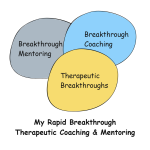Leigh D Wilson
In this short video I describe and comment on an article entitled ‘Defuse Your Ticking Time Bomb” or alternatively ‘This is exactly what fixes marriages’: one-size fits all therapy’ found at https://www.smh.com.au/lifestyle/health-and-wellness/this-is-exactly-what-fixes-marriages-one-size-fits-all-therapy-20221128-p5c1s0.html
Incidentally, I mistakenly referred to childhood development between the ages of about 0 to 7 years as being the ‘Priming Period’ when in fact it is actually the ‘Imprint Period’ of a person’s development.

Say we are not very wealthy; we are quite poor and were struggling, and so we are very, very motivated to not be poor, which is an Away-From Motivation, such that we might get an extra job or be very careful with our money. As a result, our position will slowly improve, and, of course, as it improves, our motivation will tend to wane because the situation is less urgent. As a further result, we might become more careless with our money as we lose motivation and before we know it were back in the pothole that we were in once before and will have to motivate ourselves out of it again.
This is quite a common pattern for people in business, people in their lives, people in their careers etc. It doesn’t just apply to money of course -it applies to all sorts of things.
The alternative, of course is the Towards Motivation, which looks like this: to begin with, we have this vision of what we want and while our motivation might not be as strong as it will become, as we work towards the goal it becomes stronger.

Let’s say it is for wealth as illustrated here. As we become more wealthy and we picture what that wealth will mean to us and what we can do without money, our motivation can get stronger and stronger.
So they are quite different charts and produce quite different patterns of behaviour. These diagrams incidentally, are taken out of my book “Overcoming Financial Stress”, which you can get on my website or on Amazon.
The results we get in life are very much influenced by the things that we think about, about the thoughts we have, how we focus our attention on our thinking. So with an Away-From Motivation we are focusing on negative things. We have these negative images.
Furthermore, because our unconscious mind doesn’t process negatives very well, if we are saying to ourselves “I don’t want to be poor” our unconscious mind can overlook the “don’t” part of it and will start to focus on being poor. So in this way, it could work towards creating the situation we want to avoid rather than the reverse.
So if we are talking about INNER STRUGGLES and we are using Away-From Motivation, we might be thinking to ourselves “I don’t want to be anxious”, while a Toward Motivation version of that might be “I choose to be relaxed and at peace”.
With respect to overwhelm, using Away-From Motivation, you might say “I really don’t want to be overwhelmed” or “I’m sick of being overwhelmed”.
If you are using Toward Motivation, you might be saying to yourself “although there is a lot to do, I’ve set my priorities and will now tackle each item, calmly, one by one”.
With respect to weight, using Away-From Motivation, you might say “I’m so sick of being overweight”, whereas a Toward Motivation version of that might be that “I really care about my health, I love my body and I choose to work towards feeling lighter”.
Now most of us will use a combination of these types of motivation as we tend to favour one over the other, a bit like some people tend to look on the glass being half-full, whereas others will look on it as being half-empty. But, we do have a choice: we can choose the sort of motivation we focus on and that can affect our thought patterns, which will affect how we feel.
I’ve actually tested this. As you might know, I do quite a bit of distance running and when I’ve perhaps overcooked it a bit, having run a bit too far, and I’m struggling a bit to get home, I find that if I start to think negatively, if I think “I will I make it? or “I don’t know that I can make it, it’s too far to go, I’m feeling tired” I definitely feel my energy drain, whereas, if I think to myself in a positive sense “all I’ve got to do is run to the next light pole, and that’s all it got to worry about”, “just worry about the next step”, “how great I’ll feel when I get to the end of this, having met this challenge”, “I feel really good and I’ve improved my running by running this much further”, my energy is actually lifted and I feel much more powerful.
So the way you think about things certainly does make a difference!
Imagine being an Olympic athlete and training. You’d want to carry a positive image around with you to give you the energy and the resourcefulness and persistence that would be required for all the training necessary to achieve that goal. And so you’d probably carry around with you the image of perhaps standing on the victory podium, or being presented with a gold medal, or perhaps the acclaim that you’re going to receive from your friends and family, and possibly the nation.
It can often be helpful to use Away-From Motivation to get started with something, as getting started can often be the hardest part. So, if we use Away-From Motivation at this stage, it can really force us to get moving quickly, to gather our resources and start to do something. But once we’ve made some progress, it can be much healthier start using a Towards Motivation form of motivation.
It might be useful to take note of the types of motivation your friends use. You might find that people who are constantly motivated Away-From take a bit of a toll on you, whereas people who are Toward motivated will tend to lift you up.
In a team situation, it can be helpful to have a Towards Motivation person dream of the goal and paint the big picture to describe where the group can get to, what they can achieve and then have an Away-From Motivation person to look for all the pitfalls and obstacles that might need to be overcome to achieve that dream. So in that situation, a combination can be very helpful.
As far as your INNER STRUGGLES are concerned, I urge you to consider the type of motivation that you are using and realise that this can affect how you feel, which can affect your energy levels. It can certainly affect the direction you head and the success that you achieve.
Of course, if you have persistent problems with your INNER STRUGGLES, if you’re unable to get rid of them no matter what, then, maybe, we should have a chat.
Sometimes they can be caused by issues that are more deeply seated, issues that can be sorted out very quickly in a one-on-one chat, but are much more difficult to resolve when trying to work on them yourself because they involve unconscious processes that really aren’t accessible to your conscious mind.
So if you like to have a chat, you’ll find my links in various places or give me a direct message or whatever and we’ll see what we can do.
Anyway, I hope that you find this helpful. If you’re interested in finding more of my helpful tips, please subscribe to my channels in my various social media pages.
Thanks a lot.
Edited transcript







